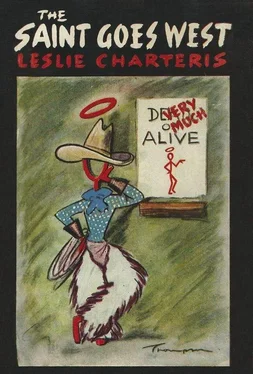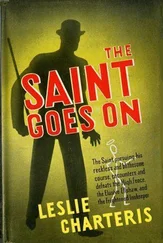Leslie Charteris - The Saint Goes West
Здесь есть возможность читать онлайн «Leslie Charteris - The Saint Goes West» весь текст электронной книги совершенно бесплатно (целиком полную версию без сокращений). В некоторых случаях можно слушать аудио, скачать через торрент в формате fb2 и присутствует краткое содержание. Год выпуска: 1942, Издательство: Hodder and Stoughton, Жанр: Крутой детектив, на английском языке. Описание произведения, (предисловие) а так же отзывы посетителей доступны на портале библиотеки ЛибКат.
- Название:The Saint Goes West
- Автор:
- Издательство:Hodder and Stoughton
- Жанр:
- Год:1942
- ISBN:нет данных
- Рейтинг книги:4 / 5. Голосов: 1
-
Избранное:Добавить в избранное
- Отзывы:
-
Ваша оценка:
- 80
- 1
- 2
- 3
- 4
- 5
The Saint Goes West: краткое содержание, описание и аннотация
Предлагаем к чтению аннотацию, описание, краткое содержание или предисловие (зависит от того, что написал сам автор книги «The Saint Goes West»). Если вы не нашли необходимую информацию о книге — напишите в комментариях, мы постараемся отыскать её.
The Saint Goes West — читать онлайн бесплатно полную книгу (весь текст) целиком
Ниже представлен текст книги, разбитый по страницам. Система сохранения места последней прочитанной страницы, позволяет с удобством читать онлайн бесплатно книгу «The Saint Goes West», без необходимости каждый раз заново искать на чём Вы остановились. Поставьте закладку, и сможете в любой момент перейти на страницу, на которой закончили чтение.
Интервал:
Закладка:
“You wouldn’t be a Texan, I suppose,” said the Saint.
“Yes, sir.” Reefe poured Bull Durham into a gutter of thin paper and spread it with his forefingers. “I heard Miss Jean say you worked in the Panhandle yourself.”
“A long time ago.”
The foreman’s deft fingers shaped and rolled. He sealed the cigarette with a flick of his tongue, and said, “Smoke?”
The sack of Bull Durham landed in Simon’s lap. Lazily Simon slid a paper out of the folder, curved it with thumb and fingers of one hand, poured tobacco, and rolled the cigarette while his other hand pulled the string of the sack against his teeth and tossed it back. His eyes met Reefe’s tranquilly over the match that the foreman leaned across with.
Neither of the Morlands would have realised that two men had measured each other, with challenge and answer, like two proud animals. And yet Jean Morland was very clearly a part of that watchful speculation, for Simon had seen something more in Hank Reefe’s manner towards her than the strictly dutiful respect to which her position as the boss’s daughter entitled her.
Reefe dragged on his own cigarette with an expressionless face, and said idly, “I was raised right around Hereford. Worked around two or three ranches up there ’fore I came west.” Smoke curled in the lamplight as he let it out through his nostrils. “There sure used to be some interestin’ characters around there.”
“Quite a few,” said the Saint.
“Was one feller I remember hearin’ about, came from England or somewhere. Everybody thought he was a dude. So when he asks for a job, first off, they put him on an outlaw horse for a laugh. Well, he was the guy who did most of the laughin’, because it turned out he could fork a bronc better ’n ’most any cowboy in that country, an’ he rode the horse out an’ kept him. After that they found out he could throw knives like somebody in a circus, an’ shoot the pips out of a six of spades just as fast as he could pull a trigger... I guess he couldn’t find anything wild enough for him around there, because later on he went south of the border an’ fought in one of those revolutions, an’ got to be a general or something. At least, so I heard. He was quite a young feller then, an’ I was only a kid myself, but I never forgot him because he had such a funny name for a chap like that. They called him the Saint.”
Simon Templar tilted his head back and blew leisured rings at the lamp.
“He must have been quite a guy.”
“Yeah... I’ve often wondered if he turned out to be the same Saint I’ve read about in the papers since. But I never met him myself, so I wouldn’t know.”
“I wonder what a man like that would be doing these days?” Morland said. “Fighting with the RAF or something like that, I suppose.”
“No,” said the girl. “That would be too conventional for him.” She hugged her knees and gazed out in to the dark. “He’d be rescuing prisoners from the Gestapo, or catching spies in London, or something of that sort.”
Simon looked at her thoughtfully.
“You mean, you really believe those stories about him?” he said teasingly, and again he had to encounter the disconcerting calm clearness of her eyes.
“I want to believe in a few things like that,” she said simply.
They went on looking at each other for a while, with the same quiet steadiness, and then Reefe’s chair creaked abruptly as he sat forward.
“Seems as though we have some late visitors,” he said.
The lights of a car were creeping up from the desert, two yellow eyes that quivered under the punishment of the road. They all watched them coming closer, twisting jerkily up the hillside, until the station wagon that carried them jolted to a stop in front of the porch.
The headlights went out and under the porch light Simon could read the words “J — B Ranch” on the door of the station wagon as it opened.
“Our neighbour,” Morland said.
The man who came clumping up the steps with the spurs jingling on his high-heeled boots was big and broad, and everything about him had a heavy swagger that was as aggressive as a clenched fist. Under the brim of his black hat he had thick black brows and a square dark jaw that looked as useful to hit as a chunk of granite. He was dressed with the curious contradictions of a man who liked his western fopperies and was still ready to do a day’s work with any of them. There were rubies and gold flowers in the buckle of his hat-band, ruby eyes in the longhorn steer’s head knotted in his scarf, jewels and gold inlay in the big silver buckle of his belt, but all of them had been smoothed and scarred with service, like the fancy leather trim on his dusty gaberdines. He showed a perfect set of white teeth and said, “Hullo ev’rybody.”
Unexpectedly, his voice was a soft tenor, not quite light enough to be effeminate, and yet light enough to strike a note that set the Saint’s delicate sense of menaces on edge.
Morland said pleasantly, “Hullo Max.” He made the only necessary introduction. “This is Mr... er... Templar. Mr Valmon.”
“Glad to know you, Mr Templar.”
Max Valmon’s grip was as hard as his voice was soft. Simon was expecting that. He smiled gently, and used some of the strength of his own right hand. It gave the encounter an air of rather excessive cordiality, and made Valmon’s eyes harden a little under his heavy brows.
“Glad to know you, Max,” said the Saint affably.
Valmon’s glance held another moment of suspicious calculation, and then he turned away and tossed his hat in to a chair. He sat on the arm of the chair and said, “Well, Don — got any news for me?”
Morland knocked out his pipe and began to refill it.
“I don’t think so. We haven’t done very much. Went into town this morning and got stuck with a blow-out coming home. Luckily Mr Templar came along, and—”
“I don’t mean that sort of news.”
“Well, really, there isn’t—”
“I mean, haven’t you made up your mind to accept my offer for the Circle Y?”
Morland blinked.
“Why no, Max. I told you the other day I wasn’t planning to sell. Jean and I like it here.”
“But I told you I was planning to buy.” Valmon’s voice was still soft and friendly. “I’m obstinate. And I was here first. Why don’t you face it? You don’t know much about this country, Don. It won’t feed both of us.”
The older man frowned in a sort of innocent puzzlement, his thumb poised over the bowl of his pipe. Reefe’s chair became still, as if chilled into suddenly watchful waiting, but Morland didn’t seem to be ready with a lead. It was as though he had just begun to sense something in Valmon’s undertones that was so foreign to his experience that he was afraid of being mistaken about it.
It was the Saint who hooked a leg over the arm of his chair and said diffidently, “Not that it’s particularly my business, but you make it sound like peculiar country. What makes it that way?”
Valmon turned with his flashing smile.
“Water,” he said. “I’ve got a spring on my side of the hills, but it goes dry every summer.”
“We do all right,” Reefe said quietly.
“I know.” Valmon’s smile was untouched. “But your stream rises on my land. Only it doesn’t stay there long enough to do me much good, especially when it runs low. To do any good, I’d have to blast a new channel — turn it around that shoulder up there, and let it run down my way to where I could build a dam. Of course, that’s the same as starving you out.”
“The law won’t let you do that,” Reefe said.
Valmon shrugged.
“I don’t know. The water comes from my property. The law couldn’t say much after I’d done it, and it wouldn’t take much doing. Just a few sticks of dynamite in the right places, and you’d be dry. Then I suppose you could go to court and try to get an order to make me blast it the other way again. But before you could do that, and make me do it, you wouldn’t have any stock. So where does it get you?”
Читать дальшеИнтервал:
Закладка:
Похожие книги на «The Saint Goes West»
Представляем Вашему вниманию похожие книги на «The Saint Goes West» списком для выбора. Мы отобрали схожую по названию и смыслу литературу в надежде предоставить читателям больше вариантов отыскать новые, интересные, ещё непрочитанные произведения.
Обсуждение, отзывы о книге «The Saint Goes West» и просто собственные мнения читателей. Оставьте ваши комментарии, напишите, что Вы думаете о произведении, его смысле или главных героях. Укажите что конкретно понравилось, а что нет, и почему Вы так считаете.












